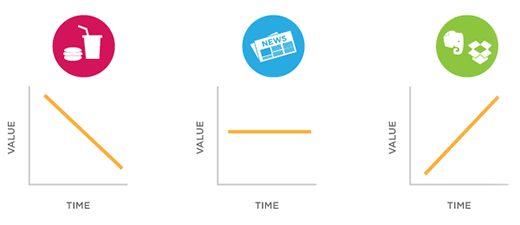The full piece is worth a read for anyone involved in app development or marketing, but an excerpt is below.
I’ve argued that Apple caused the race to the bottom in App Store pricing, but now I’m starting to think that Apple just accelerated the inevitable. The App Store is by no means a free market, but it is an efficient one. Early on I was able to charge $9.99 for my app Trip Cubby, but now most people use free or cheaper alternatives, even though I dropped the price all the way to $2.99. The odd thing about paying a fixed, one-time price for software is that people who find the most value are essentially subsidized by people who pay, but don’t end up liking/needing/using the app.
There’s also the matter of value over time. As shown in this brilliant chart — created by the founder of Pocket, and inspired by the CEO of Evernote — paying a one-time, fixed price for something really only makes sense for commodities that diminish in value:

Barnard continues:
And that’s exactly what we’ve seen in the App Store. People have no problem paying 99¢ for a gimmick, and don’t mind risking 99¢ on an app whose value is unproven, but trying to make the boxed software model work at 99¢ a pop is a fool’s errand. Sure, gimmicks and mass market apps like Camera+ seem to prove the opposite, but they are the outliers. The vast majority of apps are financial flops even though they deliver tremendous value to their niche.Barnard is the developer behind Launch Center Pro and other iOS apps.
And all of this brings us back to Sparrow. Most Mac and iOS users are content with Apple’s free Mail apps, and of those who find Mail lacking, only a small percentage really care enough to spend money on an alternative. So, Sparrow was ultimately a very niche app. But as we saw in the days after Google acquired Sparrow, the niche it served found a lot of value in the app and were incredibly disappointed to see the app shelved. I’m still not sure how Sparrow could have empowered those who received more value to pay more for it, but developers who crack that nut are the ones who will still be making a living on apps in the years to come.
沒有留言:
張貼留言